Unit 1 Where did you go on vacation? Section A Grammar focus-3c 语法课件(25张PPT,内嵌音频)2023-2024学年人教版八年
文档属性
| 名称 | Unit 1 Where did you go on vacation? Section A Grammar focus-3c 语法课件(25张PPT,内嵌音频)2023-2024学年人教版八年 | 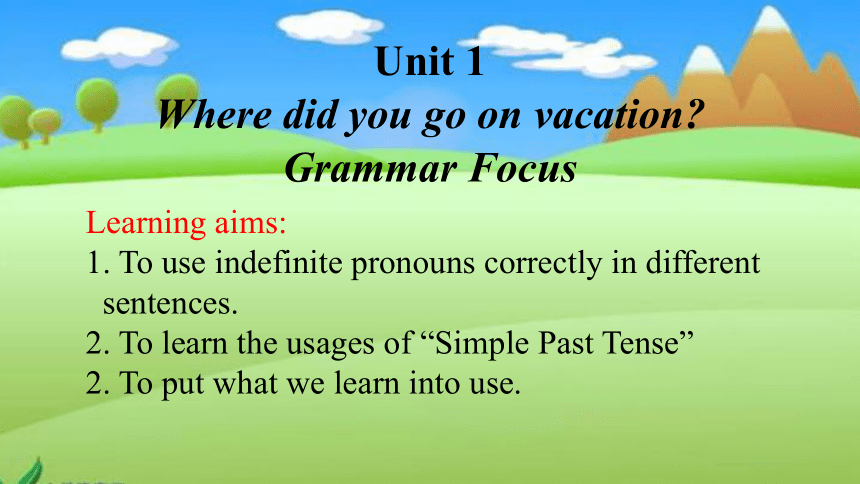 | |
| 格式 | pptx | ||
| 文件大小 | 2.3MB | ||
| 资源类型 | 教案 | ||
| 版本资源 | 人教新目标(Go for it)版 | ||
| 科目 | 英语 | ||
| 更新时间 | 2023-07-18 21:06:10 | ||
图片预览

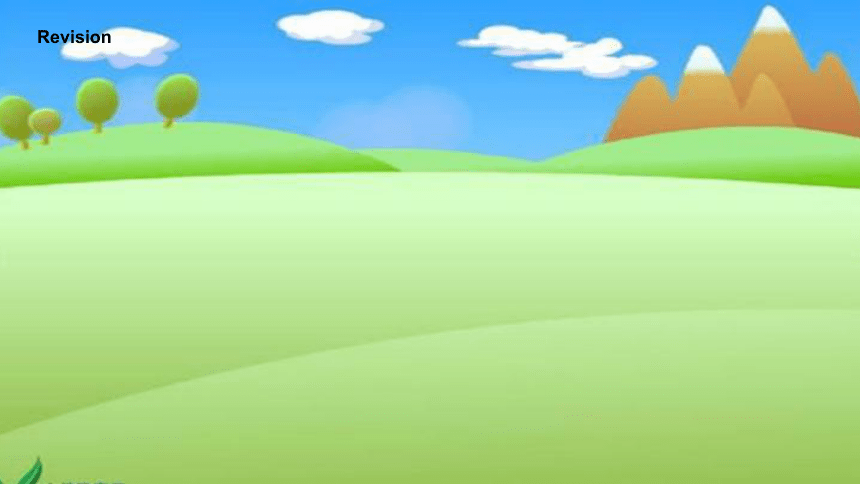
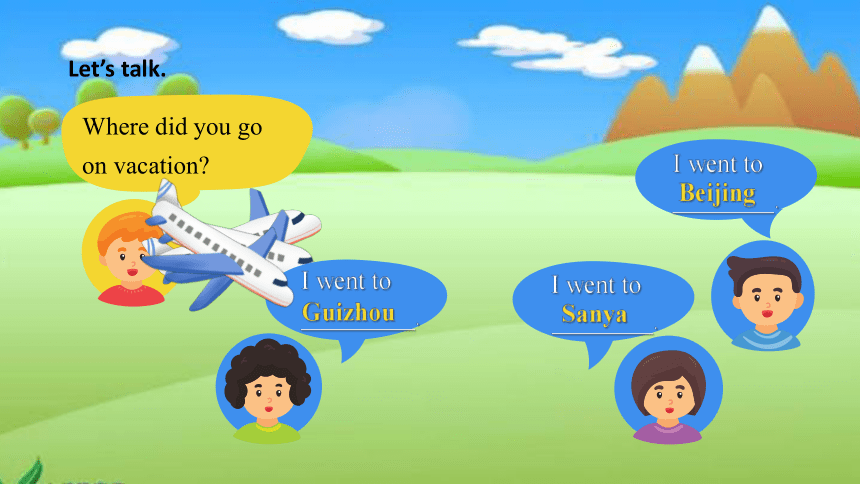
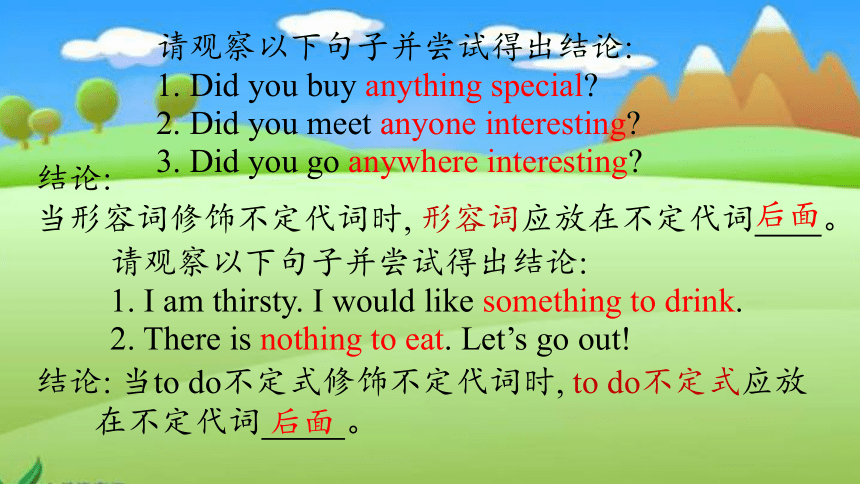
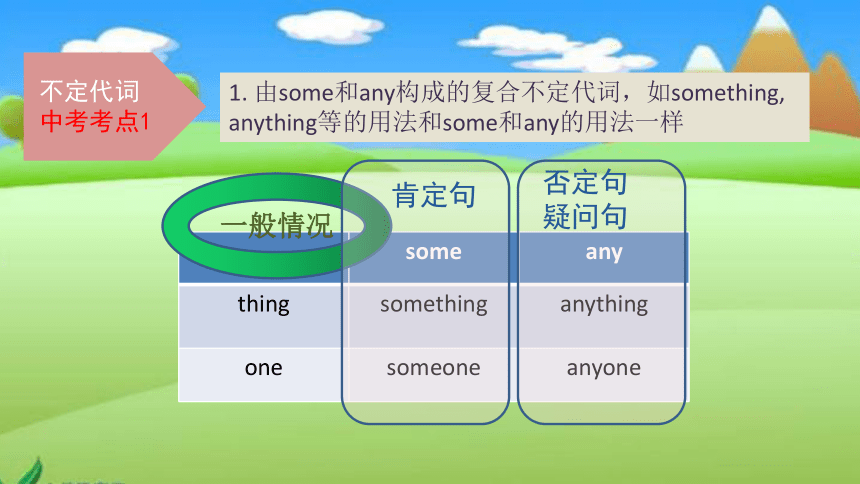
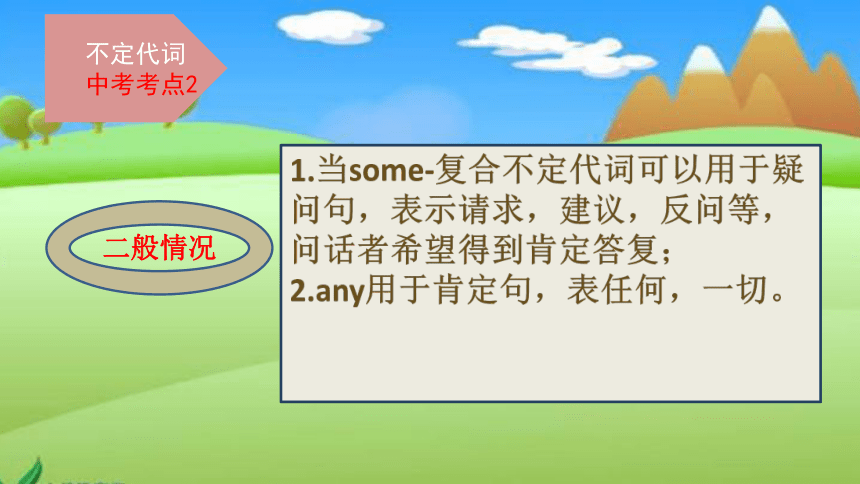
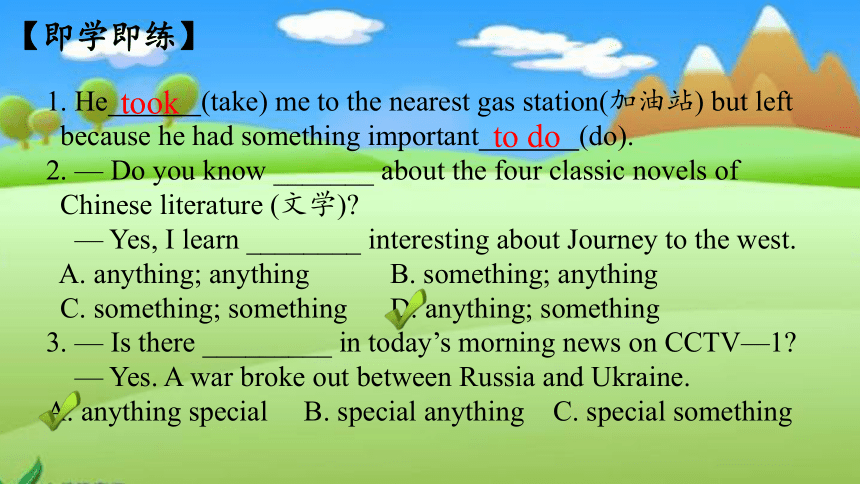
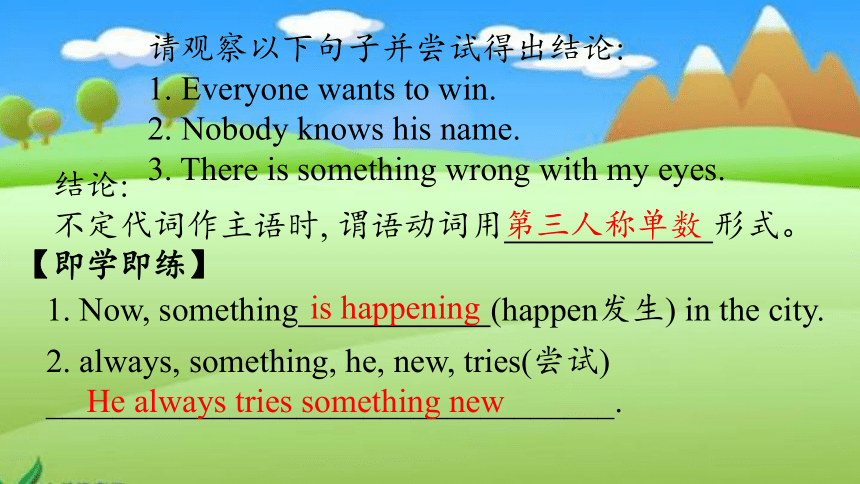
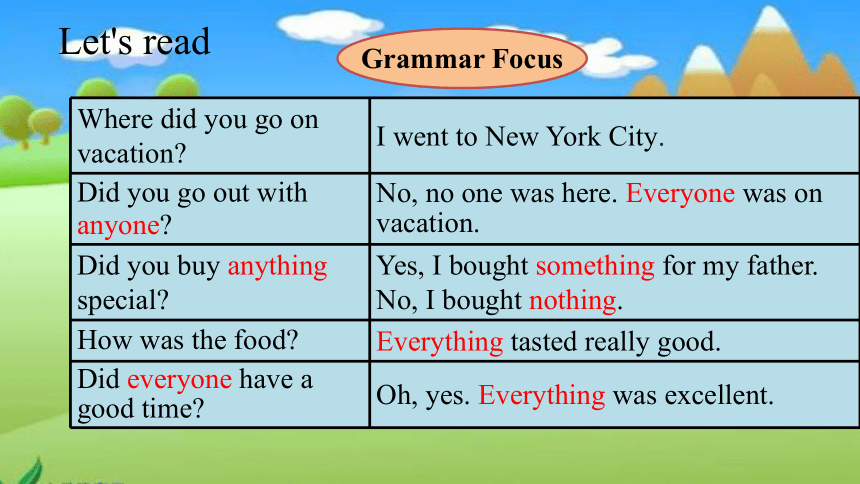
文档简介
(共25张PPT)
Unit 1
Where did you go on vacation
Grammar Focus
Learning aims:
1. To use indefinite pronouns correctly in different
sentences.
2. To learn the usages of “Simple Past Tense”
2. To put what we learn into use.
Revision
Where did you go on vacation
I went to ________.
Beijing
I went to _________.
Guizhou
I went to ________.
Sanya
Let’s talk.
请观察以下句子并尝试得出结论:
1. Did you buy anything special
2. Did you meet anyone interesting
3. Did you go anywhere interesting
结论:
当形容词修饰不定代词时, 形容词应放在不定代词 。
后面
请观察以下句子并尝试得出结论:
1. I am thirsty. I would like something to drink.
2. There is nothing to eat. Let’s go out!
结论: 当to do不定式修饰不定代词时, to do不定式应放
在不定代词 。
后面
不定代词
中考考点1
1. 由some和any构成的复合不定代词,如something, anything等的用法和some和any的用法一样
some any
thing something anything
one someone anyone
一般情况
肯定句
否定句
疑问句
不定代词中考考点2
二般情况
1.当some-复合不定代词可以用于疑问句,表示请求,建议,反问等,问话者希望得到肯定答复;
2.any用于肯定句,表任何,一切。
【即学即练】
1. He (take) me to the nearest gas station(加油站) but left
because he had something important (do).
2. — Do you know _______ about the four classic novels of
Chinese literature (文学)
— Yes, I learn ________ interesting about Journey to the west.
A. anything; anything B. something; anything
C. something; something D. anything; something
3. — Is there _________ in today’s morning news on CCTV—1
— Yes. A war broke out between Russia and Ukraine.
A. anything special B. special anything C. special something
took
to do
请观察以下句子并尝试得出结论:
1. Everyone wants to win.
2. Nobody knows his name.
3. There is something wrong with my eyes.
结论:
不定代词作主语时, 谓语动词用 形式。
第三人称单数
【即学即练】
1. Now, something (happen发生) in the city.
is happening
2. always, something, he, new, tries(尝试)
__________________________________.
He always tries something new
Where did you go on vacation I went to New York City.
Did you go out with anyone No, no one was here. Everyone was on vacation.
Did you buy anything special Yes, I bought something for my father.
No, I bought nothing.
How was the food Everything tasted really good.
Did everyone have a good time Oh, yes. Everything was excellent.
Grammar Focus
Let's read
请结合课本和笔记完成下列表格:
主格 (作主语) (在动词前) 宾语 (作宾语) (在动词后) 形容词性物主代词 名词性物主代词 反身
代词
I (我) me(我) my(我的) mine(我的) myself(我自己)
we (我们) us (我们) our (我们的) ours (我们的) ourselves
(我们自己)
you(你) you(你) your(你的) yours(你的) yourself(你自己)
you(你们) you (你们) your (你们的) yours (你们的) yourselves
(你们自己)
主格 (作主语) (在动词前) 宾语 (作宾语) (在动词后) 形容词性物主代词 名词性物主 代词 反身
代词
he(他) him(他) his (他的) his (他的) himself
(他自己)
she(她) her(她) her (她的) hers (她的) herself
(她自己)
they(他们) them(他们) their (他们的) theirs (他们的) themselves
(他们自己)
it(它) it(它) its(它的) its(它的) itself(它自己)
(1) myself 与 yourself
反身代词 ,即表示“某人自己” 。
myself yourself himself herself itself
我自己 你自己 他自己 她自己 它自己
ourselves yourselves themselves 我们自己 你们自己 他们自己 第一二人称:所有格+self/selves
第三人称:宾格+self/selves
请观察以下句子并尝试得出结论:
1. Everyone is doing something to enjoy themselves.
2. He lives alone and cooks by himself.
结论: 1. 反身代词不作 。
2. enjoy oneself 玩得开心 by oneself 靠自己
teach oneself 自学 help oneself 自便
lose oneself 迷路
3. one随着人称(I, he, she等)的改变而 。
主语
改变
【即学即练】
1. I enjoyed (oneself) on Sunday.
2. Linda and Tom went to the World Park by (oneself).
myself
themselves
Once upon a time, there was a time.
A temple was in the mountain.
A little monk lived in the temple.
He happily went down the mountain to carry water.
One day, a thin monk came to the temple.
Then, these two monks carried water together.
Finally, all of them didn’t carry water any more.
Suddenly, the temple was on fire.
一般过去时
总结:1. 一般过去时的特殊疑问句结构:
W-H(特殊疑问代词)+ did +主语+动词原形+其他?
2. 一般过去时的一般疑问句结构:
Did +主语+动词原形+其他?
W-H(特殊疑问代词)+ was/were +主语+其他?
Was/Were+主语+其他?
一般过去时
定义:①表示______某个时间里发生的动作或状态;
②表示_____习惯性、经常性的动作或行为。
过去
过去
常用时间标志词: yesterday; just now; in 1997; last month;
2 years ago;...
常用不规则动词: am/is-was are-were get-got see-saw say-said speak-spoke
give-gave have-had go-went eat-ate come-came drink-drank
take-took ride-rode fly-flew sit-sat make-made write-wrote
put-put read-read run-ran do-did draw-drew sweep-swept
不定代词中考考点3
复合不定代词作主语,谓语动词用单数
1.Something ____ wrong with my watch.(be)
2.Well, everyone _______ to win. (want)
3. Nobody __________ what the weather will be like.(know)
4.There_________ something wrong with my bike.(be)
is
is
wants
knows
不定代词中考考点4
形容词修饰复合不定代词,要置于其后。
I meet someone interesting.
Did you meet anyone interesting
I want something special.
Did you eat anything delicious
be动词的一般过去时
am (is) →was are →were
1.肯定句:主语 + was/were + 其他.
He _____ at home yesterday.
We _____ happy at the party.
was
were
2.否定句:主语 + was/were not + 其他.
He _______ at home yesterday.
We _______ happy at the party.
wasn’t
weren’t
3.疑问句: Was/Were + 主语 + 其他
--_____ he at home yesterday
--Yes, he ____. /No, he ______.
Was
was
wasn’t
实义动词的一般过去时
1. 肯定句: 主语+动词过去式+其它
I went to the movie yesterday.
2. 否定句: 主语+didn’t+动词原形+其它
I ______ ____ to the movie yesterday.
3. 一般疑问句: Did +主语+动词原形+其它
--_____ you ____ to the movie yesterday
--Yes, I ____. /No, I ______.
didn’t go
Did go
did
didn’t
3a
anyone
something
anything
everything
nothing
Linda: Did you do _________ fun on your vacation, Alice
Alice: Yes, I did. I went to Sanya.
Linda: How did you like it
Alice: Well, it was my first time there, so_________ was really interesting.
Linda: Did you do with ________
Alice: Yes, I did. I went with my sister.
Linda: Did you go shopping
Alice: Of course! I bought __________ for my parents, but _________ for myself.
Linda: Why didn’t you buy _________ for yourself
Alice: I didn’t really see__________ I liked.
anything
everything
anyone
something
nothing
anything
anything
当然;自然。
Of course not. 当然不。
反身代词,我自己
反身代词,你自己
1.How did you like it?
=What do you think of it
你觉得它怎么样?
3b
anything everything nothing everyone no one
anything
everyone/anyone
Everything
nothing
no one
Fill in the blanks in the email message with the words in the box.
Ask your group questions about their last vacation. Then tell the class your results.
Did you… Everyone Someone No one
eat anything at a restaurant
read anything interesting
visit anyone in your family
buy anything
keep a diary
3c
写日记
Summary
一般过去时
时间状语
yesterday, last ...,
...ago, just now, in...
基本句式
肯定句
否定句
一般疑问句及回答
动词变化
规则
变化
不规则变化
v.+ed
v.(以e结尾)+d
y变i加-ed
双写辅音字母加-ed
1. David is a tennis player. He to play tennis when he
was six years old.
A. begins B. will begin C. began D. has begun
2. — Alice has gone out.
— Oh, has she What time _____ she _____
A. has; gone B. will; go C. did; go D. is; going
3. — Alice has gone out.
— Oh, has she What time ______ she ______
A. has; gone B. will; go
C. did; go D. is; going
Homework
背诵Grammar focus部分。
复习复合不定代词及反身代词的用法。
Unit 1
Where did you go on vacation
Grammar Focus
Learning aims:
1. To use indefinite pronouns correctly in different
sentences.
2. To learn the usages of “Simple Past Tense”
2. To put what we learn into use.
Revision
Where did you go on vacation
I went to ________.
Beijing
I went to _________.
Guizhou
I went to ________.
Sanya
Let’s talk.
请观察以下句子并尝试得出结论:
1. Did you buy anything special
2. Did you meet anyone interesting
3. Did you go anywhere interesting
结论:
当形容词修饰不定代词时, 形容词应放在不定代词 。
后面
请观察以下句子并尝试得出结论:
1. I am thirsty. I would like something to drink.
2. There is nothing to eat. Let’s go out!
结论: 当to do不定式修饰不定代词时, to do不定式应放
在不定代词 。
后面
不定代词
中考考点1
1. 由some和any构成的复合不定代词,如something, anything等的用法和some和any的用法一样
some any
thing something anything
one someone anyone
一般情况
肯定句
否定句
疑问句
不定代词中考考点2
二般情况
1.当some-复合不定代词可以用于疑问句,表示请求,建议,反问等,问话者希望得到肯定答复;
2.any用于肯定句,表任何,一切。
【即学即练】
1. He (take) me to the nearest gas station(加油站) but left
because he had something important (do).
2. — Do you know _______ about the four classic novels of
Chinese literature (文学)
— Yes, I learn ________ interesting about Journey to the west.
A. anything; anything B. something; anything
C. something; something D. anything; something
3. — Is there _________ in today’s morning news on CCTV—1
— Yes. A war broke out between Russia and Ukraine.
A. anything special B. special anything C. special something
took
to do
请观察以下句子并尝试得出结论:
1. Everyone wants to win.
2. Nobody knows his name.
3. There is something wrong with my eyes.
结论:
不定代词作主语时, 谓语动词用 形式。
第三人称单数
【即学即练】
1. Now, something (happen发生) in the city.
is happening
2. always, something, he, new, tries(尝试)
__________________________________.
He always tries something new
Where did you go on vacation I went to New York City.
Did you go out with anyone No, no one was here. Everyone was on vacation.
Did you buy anything special Yes, I bought something for my father.
No, I bought nothing.
How was the food Everything tasted really good.
Did everyone have a good time Oh, yes. Everything was excellent.
Grammar Focus
Let's read
请结合课本和笔记完成下列表格:
主格 (作主语) (在动词前) 宾语 (作宾语) (在动词后) 形容词性物主代词 名词性物主代词 反身
代词
I (我) me(我) my(我的) mine(我的) myself(我自己)
we (我们) us (我们) our (我们的) ours (我们的) ourselves
(我们自己)
you(你) you(你) your(你的) yours(你的) yourself(你自己)
you(你们) you (你们) your (你们的) yours (你们的) yourselves
(你们自己)
主格 (作主语) (在动词前) 宾语 (作宾语) (在动词后) 形容词性物主代词 名词性物主 代词 反身
代词
he(他) him(他) his (他的) his (他的) himself
(他自己)
she(她) her(她) her (她的) hers (她的) herself
(她自己)
they(他们) them(他们) their (他们的) theirs (他们的) themselves
(他们自己)
it(它) it(它) its(它的) its(它的) itself(它自己)
(1) myself 与 yourself
反身代词 ,即表示“某人自己” 。
myself yourself himself herself itself
我自己 你自己 他自己 她自己 它自己
ourselves yourselves themselves 我们自己 你们自己 他们自己 第一二人称:所有格+self/selves
第三人称:宾格+self/selves
请观察以下句子并尝试得出结论:
1. Everyone is doing something to enjoy themselves.
2. He lives alone and cooks by himself.
结论: 1. 反身代词不作 。
2. enjoy oneself 玩得开心 by oneself 靠自己
teach oneself 自学 help oneself 自便
lose oneself 迷路
3. one随着人称(I, he, she等)的改变而 。
主语
改变
【即学即练】
1. I enjoyed (oneself) on Sunday.
2. Linda and Tom went to the World Park by (oneself).
myself
themselves
Once upon a time, there was a time.
A temple was in the mountain.
A little monk lived in the temple.
He happily went down the mountain to carry water.
One day, a thin monk came to the temple.
Then, these two monks carried water together.
Finally, all of them didn’t carry water any more.
Suddenly, the temple was on fire.
一般过去时
总结:1. 一般过去时的特殊疑问句结构:
W-H(特殊疑问代词)+ did +主语+动词原形+其他?
2. 一般过去时的一般疑问句结构:
Did +主语+动词原形+其他?
W-H(特殊疑问代词)+ was/were +主语+其他?
Was/Were+主语+其他?
一般过去时
定义:①表示______某个时间里发生的动作或状态;
②表示_____习惯性、经常性的动作或行为。
过去
过去
常用时间标志词: yesterday; just now; in 1997; last month;
2 years ago;...
常用不规则动词: am/is-was are-were get-got see-saw say-said speak-spoke
give-gave have-had go-went eat-ate come-came drink-drank
take-took ride-rode fly-flew sit-sat make-made write-wrote
put-put read-read run-ran do-did draw-drew sweep-swept
不定代词中考考点3
复合不定代词作主语,谓语动词用单数
1.Something ____ wrong with my watch.(be)
2.Well, everyone _______ to win. (want)
3. Nobody __________ what the weather will be like.(know)
4.There_________ something wrong with my bike.(be)
is
is
wants
knows
不定代词中考考点4
形容词修饰复合不定代词,要置于其后。
I meet someone interesting.
Did you meet anyone interesting
I want something special.
Did you eat anything delicious
be动词的一般过去时
am (is) →was are →were
1.肯定句:主语 + was/were + 其他.
He _____ at home yesterday.
We _____ happy at the party.
was
were
2.否定句:主语 + was/were not + 其他.
He _______ at home yesterday.
We _______ happy at the party.
wasn’t
weren’t
3.疑问句: Was/Were + 主语 + 其他
--_____ he at home yesterday
--Yes, he ____. /No, he ______.
Was
was
wasn’t
实义动词的一般过去时
1. 肯定句: 主语+动词过去式+其它
I went to the movie yesterday.
2. 否定句: 主语+didn’t+动词原形+其它
I ______ ____ to the movie yesterday.
3. 一般疑问句: Did +主语+动词原形+其它
--_____ you ____ to the movie yesterday
--Yes, I ____. /No, I ______.
didn’t go
Did go
did
didn’t
3a
anyone
something
anything
everything
nothing
Linda: Did you do _________ fun on your vacation, Alice
Alice: Yes, I did. I went to Sanya.
Linda: How did you like it
Alice: Well, it was my first time there, so_________ was really interesting.
Linda: Did you do with ________
Alice: Yes, I did. I went with my sister.
Linda: Did you go shopping
Alice: Of course! I bought __________ for my parents, but _________ for myself.
Linda: Why didn’t you buy _________ for yourself
Alice: I didn’t really see__________ I liked.
anything
everything
anyone
something
nothing
anything
anything
当然;自然。
Of course not. 当然不。
反身代词,我自己
反身代词,你自己
1.How did you like it?
=What do you think of it
你觉得它怎么样?
3b
anything everything nothing everyone no one
anything
everyone/anyone
Everything
nothing
no one
Fill in the blanks in the email message with the words in the box.
Ask your group questions about their last vacation. Then tell the class your results.
Did you… Everyone Someone No one
eat anything at a restaurant
read anything interesting
visit anyone in your family
buy anything
keep a diary
3c
写日记
Summary
一般过去时
时间状语
yesterday, last ...,
...ago, just now, in...
基本句式
肯定句
否定句
一般疑问句及回答
动词变化
规则
变化
不规则变化
v.+ed
v.(以e结尾)+d
y变i加-ed
双写辅音字母加-ed
1. David is a tennis player. He to play tennis when he
was six years old.
A. begins B. will begin C. began D. has begun
2. — Alice has gone out.
— Oh, has she What time _____ she _____
A. has; gone B. will; go C. did; go D. is; going
3. — Alice has gone out.
— Oh, has she What time ______ she ______
A. has; gone B. will; go
C. did; go D. is; going
Homework
背诵Grammar focus部分。
复习复合不定代词及反身代词的用法。
同课章节目录
- Unit 1 Where did you go on vacation?
- Section A
- Section B
- Unit 2 How often do you exercise?
- Section A
- Section B
- Unit 3 I'm more outgoing than my sister.
- Section A
- Section B
- Unit 4 What's the best movie theater?
- Section A
- Section B
- Unit 5 Do you want to watch a game show?
- Section A
- Section B
- Unit 6 I'm going to study computer science.
- Section A
- Section B
- Unit 7 Will people have robots?
- Section A
- Section B
- Unit 8 How do you make a banana milk shake?
- Section A
- Section B
- Unit 9 Can you come to my party?
- Section A
- Section B
- Unit 10 If you go to the party, you'll have a grea
- Section A
- Section B
